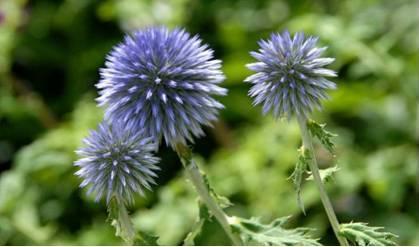Echinops شکر تیغال
DESCRIPTION
Echinops sphaerocephalus, known by the common names glandular globe-thistle, great globe-thistle or pale globe-thistle, is a species of globe-thistle belonging to the family Asteraceae.
This is a glandular, woolly perennial herbaceous plant with an average height of 50–100 centimetres, occasionally reaching around two meters.
Its erect branching, gray, slightly wrinkled and hairy stems bear the occasional large, soft, sharply toothed, sharp-lobed pointed green leaves. They are sticky hairy above, and white woolly.
Atop each stem is an almost perfectly spherical inflorescence up to 6 cm in diameter.
The flowers are pollinated by insects and are hermaphrodite. The fruits are hairy cylindrical achenes about 7 to 8 mm long. They ripen from September through October.

MEDICINAL USES
Echinops echinatus is one of the plants marketed in India. Brahmadandi has the reputation of a potent aphrodisiac and hence it should have an androgenic mode of action. Previous reports on E. echinatus suggest an antiandrogenic action for the plant. The present study was undertaken to find out whether E. echinatus can be used as clinically effective medicine for the treatment of benign prostatic hyperplasia (BPH) where antiandrogenic agents are useful. In Testosterone was administered to the rats along with the test extracts for a period of 28 days. Finasteride was used as positive control. Results were E. echinatus extracts attenuated the increase in the prostatic/body weight ratio induced by testosterone. Butanolic fraction of ethanolic extract exhibited the best activity. Further histological studies have shown a considerable improvement in the prostatic histoarchitecture in the extract-treated groups when compared with testosterone treated group.
Anti-inflammatory studies were conducted on an ethanol extract of Echinops echinatus whole plant. The extract effectively inhibited the acute inflammation induced in rats by, formaldehyde and adjuvant and the chronic arthritis induced by formaldehyde and adjuvant. The extract was more effective parenterally than orally.
